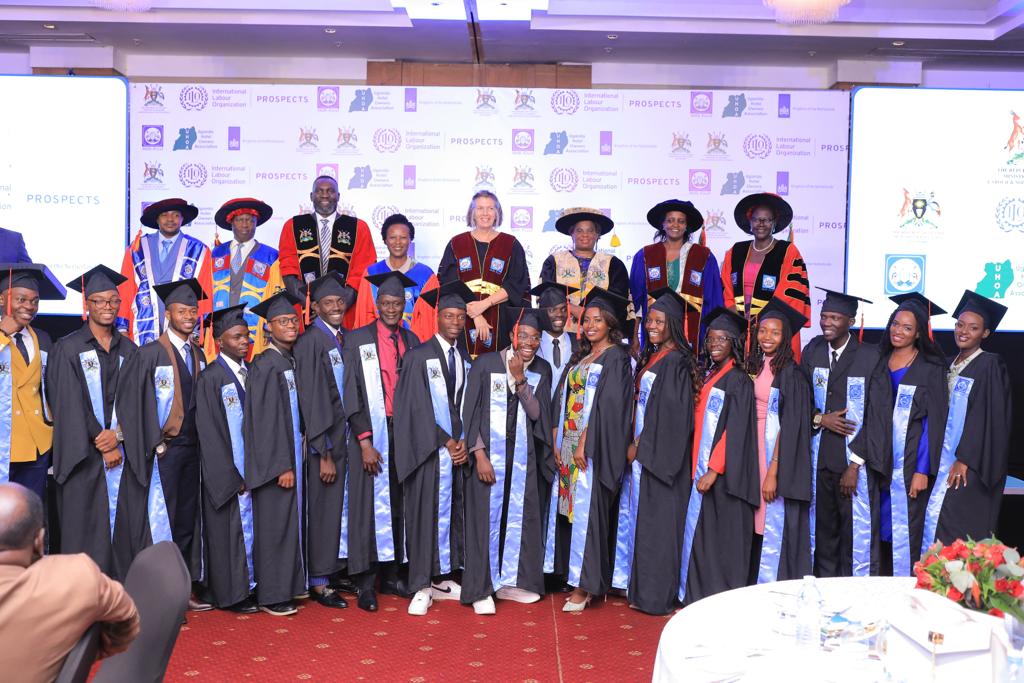The Ministry of Gender, Labour and Social Development on Tuesday held a graduation ceremony for the first cohort of apprentices the country has registered in many years, marking a significant milestone in the country’s efforts to tackle unemployment and underemployment.
The 90 graduates were crowned at a colourful ceremony held at Sheraton Hotel in Kampala after successfully accomplishing on-job studies in different fields in the Hotel Industry.
“Today’s ceremony holds significance not only for you as individuals but for our entire nation. We are here to witness the first graduation of apprentices in generations. This marks the inauguration of a new and promising chapter in our country’s development.” The National Apprenticeship Superintendent, Mr. Alex Asiimwe, who is also the Commissioner Labour, Industrial Relations and Productivity, noted.
He revealed that in the colonial and immediate post-colonial era, apprenticeships played a critical role in skills development, however the program fizzled out in the 1970s due to a host of factors, including the expulsion of Asians and the restructuring of industrial training institutions, which, unfortunately, did not adequately address the necessary legal and institutional mechanisms.
The Minister for Gender, Labour and Social Development, Amongi Betty, who presided over the graduation, revealed that in 2018 President Yoweri Museveni tasked the Ministry to revitalize the National Apprenticeship Scheme in key sectors of the economy and subsequently a national Framework was approved by Cabinet.
She added that working in collaboration with Uganda Hotel Owners’ Association (UHOA), Uganda Hotel and Tourism Training Institute (UHTTI) and Directorate of Industrial Training (DIT), and with financial and technical support from The Netherlands Embassy and the International Labour Organisation (ILO), the Ministry successfully launched an Apprenticeship Pilot Scheme in the Hotel sub-sector, leading up to the Tuesday graduation.
The Minister highlighted that apprenticeships are a powerful strategy to confront skills deficiencies in the labour market because it offers hands-on skill development, engages employers directly, and provides tailored learning that aligns with industry needs.
“This approach responds to President Museveni’s prioritization of skilling and re-skilling of school leavers and dropouts to enhance their employability, including self-employment.” She said, adding that it as well resonates with the Economic Growth Strategy, which focuses on developing a knowledgeable, skilled, and ethical workforce.
The Minister praised the collaborative efforts of stakeholders including the instructors and 35 hotels spread across the country that accepted and trained the apprentices.
She urged all employers to embrace apprenticeships as a key avenue for skills development, enhanced production and productivity.
Commissioner Asiimwe revealed that 67% of the apprentices had already been offered employment by the host and non-hosting hotels, while others had opened up individual businesses based on the skillsets they had acquired especially in pastry and baking.

The UN Resident Coordinator, Her Excellency, Susan Ngongi Namondo commended Uganda for its open-door policy for refugees and the promotion of regional integration, which had enabled learners from refugee and host communities benefit from the pilot phase of the new apprenticeship program.
The Ambassador of the Netherlands to Uganda, Her Excellency Karin Boven noted that her country was happy to have provided financial support for the intervention and pledged to continue supporting the skills development agenda.
The apprentices were implored to perform their duties with excellence and rebuild the value of apprenticeship in Uganda.
The ceremony was also attended by the chairperson Uganda Hotel Owners’ Association, Ms. Susan Muhwezi, the Director Directorate of Industrial Training Dr. Patrick Byakatonda, the International Labour Organisation Chief Technical Advisor, Mr. Steven Opio, and the Principal Uganda Hotel and Tourism Training Institute, Mr. Richard Kawere, among others.




